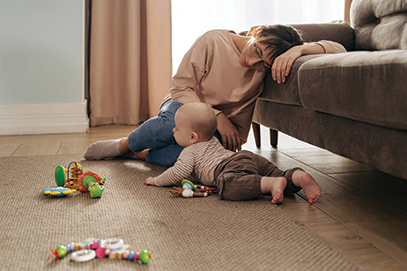Baby Blues or Something More?
May 28, 2024
Get the Help You Need for Postpartum Depression
Preparing for and caring for a baby can be a joyous time. But some new moms — and dads — experience symptoms of depression after childbirth. If you or a loved one has depression after childbirth, it could be postpartum depression.

Nirvanni Chatoori, PhD, a perinatal educator and board-certified maternal-newborn nurse with Memorial Regional Hospital Family Birthplace, says postpartum depression is one of many pregnancy- and childbirth-related mood and anxiety disorders.
“The good thing is, postpartum depression is treatable,” Dr. Chatoori says. “And it’s important to know you aren’t alone.”
According to Postpartum Support International (PSI), one in five moms and one in 10 dads experience postpartum depression. So, how can you recognize postpartum depression, and what can you do to treat it?
Symptoms of Postpartum Depression
Symptoms of postpartum depression vary, but one thing people with postpartum depression have in common is the timing.
“Pregnancy-related depression symptoms can start any time during pregnancy or within the first year after childbirth,” Dr. Natoori says.
Depression during pregnancy may be called antepartum or prenatal depression, while depression after pregnancy is known as postpartum depression.
Signs of postpartum depression include:
- Anger or irritability
- Excessive crying
- Extreme sadness
- Fatigue and exhaustion
- Feelings of guilt, shame, hopelessness, or worthlessness
- Lack of interest in your baby
- Lack of interest in things you used to enjoy
- Sleep changes
- Thoughts of harming your baby
- Thoughts of self-harm
- Trouble bonding with your baby
Causes of Postpartum Depression
Postpartum depression can happen to anyone, but Dr. Chatoori says several risk factors could increase your chances of developing this condition.
“Your social, emotional, and medical health can put you at higher risk for postpartum depression,” Dr. Chatoori says. “You may be at higher risk if you lack support from family and friends, have a history of depression, or experience financial stress.”
Other postpartum depression risk factors include:
- Complications during pregnancy or delivery
- Diabetes
- History of abuse
- Infertility
- Miscarriage or infant loss
- Stopping breastfeeding suddenly
- Thyroid and other endocrine disorders
- Unplanned pregnancy
Postpartum Depression Treatments
Postpartum depression treatments vary based on the severity of symptoms. More severe postpartum depression may require counseling and medication.
Milder cases of postpartum depression, often called “baby blues", may be treatable with self-care strategies. Exercise, healthy eating, yoga, and relaxation techniques can help.
Dr. Natoori counsels new parents through Memorial Family Birthplace's online class, Caring for Moms. During the course, she advises couples to take time for themselves to keep their relationship strong throughout pregnancy and after childbirth.
“The change in routine, lack of sleep and fatigue new parents experience can put stress and strain on a relationship,” Dr. Natoori says. “Set aside time to be together.”
You can also help yourself by:
- Enlisting help with housework and chores.
- Making time for a walk, a trip to the store, or watching your favorite TV show.
- Prepping and freezing meals for easy dinners.
- Taking quick naps when possible.
“Partners can also help new moms by playing a bigger role in a new baby’s daily routine,” Dr. Chatoori says. “Take turns with nightly feedings, participate in bath time and take the baby out for walks.”
Getting Help for Postpartum Depression
If postpartum depression affects you or someone you know, don’t wait to seek help. Talk to your doctor or call 911 immediately if you experience an emergency or crisis.
For non-emergencies, talk to your healthcare provider or text the PSI HelpLine at 800-944-4773 in English or 971-203-7773 in Spanish. The PSI HelpLine operates daily from 8 am – 11 pm EST.
Learn more about postpartum depression and how you can care for yourself or a loved one by registering for our online, Caring for Moms class, hosted by a board-certified maternal newborn nurse at Memorial Regional Hospital.
Visit our Maternity Classes and Support Groups page to learn about all our prenatal, labor and delivery, and postpartum classes and support groups.
